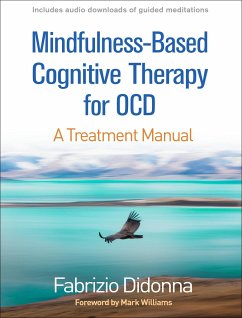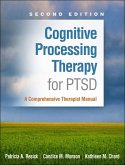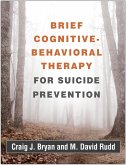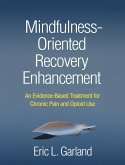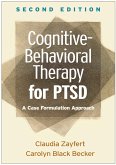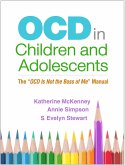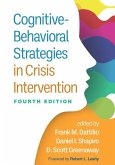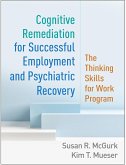- Gebundenes Buch
- Merkliste
- Auf die Merkliste
- Bewerten Bewerten
- Teilen
- Produkt teilen
- Produkterinnerung
- Produkterinnerung
This book presents the first treatment program that adapts the proven practices of mindfulness-based cognitive therapy (MBCT) to meet the unique needs of people struggling with obsessive-compulsive disorder (OCD).
Andere Kunden interessierten sich auch für
![Cognitive Processing Therapy for PTSD Cognitive Processing Therapy for PTSD]() Patricia A ResickCognitive Processing Therapy for PTSD88,99 €
Patricia A ResickCognitive Processing Therapy for PTSD88,99 €![Brief Cognitive-Behavioral Therapy for Suicide Prevention Brief Cognitive-Behavioral Therapy for Suicide Prevention]() Craig J BryanBrief Cognitive-Behavioral Therapy for Suicide Prevention82,99 €
Craig J BryanBrief Cognitive-Behavioral Therapy for Suicide Prevention82,99 €![Mindfulness-Oriented Recovery Enhancement Mindfulness-Oriented Recovery Enhancement]() Eric L GarlandMindfulness-Oriented Recovery Enhancement77,99 €
Eric L GarlandMindfulness-Oriented Recovery Enhancement77,99 €![Cognitive-Behavioral Therapy for Ptsd Cognitive-Behavioral Therapy for Ptsd]() Claudia ZayfertCognitive-Behavioral Therapy for Ptsd82,99 €
Claudia ZayfertCognitive-Behavioral Therapy for Ptsd82,99 €![Ocd in Children and Adolescents Ocd in Children and Adolescents]() Katherine McKenneyOcd in Children and Adolescents95,99 €
Katherine McKenneyOcd in Children and Adolescents95,99 €![Cognitive-Behavioral Strategies in Crisis Intervention Cognitive-Behavioral Strategies in Crisis Intervention]() Cognitive-Behavioral Strategies in Crisis Intervention110,99 €
Cognitive-Behavioral Strategies in Crisis Intervention110,99 €![Cognitive Remediation for Successful Employment and Psychiatric Recovery Cognitive Remediation for Successful Employment and Psychiatric Recovery]() Susan R McGurkCognitive Remediation for Successful Employment and Psychiatric Recovery93,99 €
Susan R McGurkCognitive Remediation for Successful Employment and Psychiatric Recovery93,99 €-
-
-
This book presents the first treatment program that adapts the proven practices of mindfulness-based cognitive therapy (MBCT) to meet the unique needs of people struggling with obsessive-compulsive disorder (OCD).
Hinweis: Dieser Artikel kann nur an eine deutsche Lieferadresse ausgeliefert werden.
Hinweis: Dieser Artikel kann nur an eine deutsche Lieferadresse ausgeliefert werden.
Produktdetails
- Produktdetails
- Verlag: Guilford Publications
- Seitenzahl: 431
- Erscheinungstermin: 27. November 2019
- Englisch
- Abmessung: 279mm x 208mm x 28mm
- Gewicht: 1225g
- ISBN-13: 9781462540525
- ISBN-10: 146254052X
- Artikelnr.: 54842950
- Herstellerkennzeichnung
- Produktsicherheitsverantwortliche/r
- Europaallee 1
- 36244 Bad Hersfeld
- gpsr@libri.de
- Verlag: Guilford Publications
- Seitenzahl: 431
- Erscheinungstermin: 27. November 2019
- Englisch
- Abmessung: 279mm x 208mm x 28mm
- Gewicht: 1225g
- ISBN-13: 9781462540525
- ISBN-10: 146254052X
- Artikelnr.: 54842950
- Herstellerkennzeichnung
- Produktsicherheitsverantwortliche/r
- Europaallee 1
- 36244 Bad Hersfeld
- gpsr@libri.de
Fabrizio Didonna, PsyD, is Professor in the Institute for Lifelong Learning of the University of Barcelona, Spain, and Visiting Professor at Shanghai Jiao Tong University in China. A clinical psychologist, he is a teacher and trainer at several postgraduate schools of cognitive-behavioral therapy in Italy. Dr. Didonna is founder and President of the Italian Institute for Mindfulness and Scientific Director of the Institute-sponsored Master's Program in Mindfulness-Based Therapy. He is Coordinator of the Unit for Obsessive-Compulsive Disorder (OCD) at the Villa Margherita private hospital in Vicenza, Italy, and Director of the MBCT for OCD Center in Vincenza. A long-time practitioner and teacher of meditation, he is an experienced instructor of mindfulness-based groups and has trained more than 2,000 participants in inpatient and outpatient settings. He was one of the first therapists to do mindfulness training with inpatients with severe disorders. Dr. Didonna has presented scientific papers, gives workshops and lectures internationally, and has published numerous articles, chapters, and books, including the Clinical Handbook of Mindfulness.
Introduction
I. Theory and Conceptualization
1. What Is OCD?
2. A Mindfulness-Based Approach to OCD
3. The MBCT for OCD Program: Rationale, Structure, and Basic Principles
4. Preparing to Conduct MBCT for OCD and Participant Assessment
II. The MBCT for OCD Program
5. Session 1: Understanding What Mindfulness Is
6. Session 2: Understanding OCD and How Mindfulness Helps
7. Session 3: Helping Family Members and Partners Support Patients with OCD
8. Session 4: Understanding One's Mistrust and Developing Real Trust
9. Session 5: Using the Senses to Develop Trust
10. Session 6: Developing a Healthy Relationship with Thoughts
11. Session 7: Developing Acceptance as a Core Step to Change
12. Session 8: Mindful Doing and Mindful Exposure
13. Session 9: Developing Self-Compassion and Self-Forgiveness
14. Session 10: Learning to Take Risks
15. Session 11: Facing Life with Trust and Dealing with Obstacles
Effectively
Appendix. Training and Supervision in MBCT for OCD
Audio Downloads:
1. Introduction (3:57)
2. Body Scan: Mindfulness of the Body (Sessions 1 and 2) (20:59)
3. Mindfulness of the Breath (Session 1) (11:12)
4. Sitting Meditation: Mindfulness of the Breath and Body (Session 2)
(18:21)
5. Breathing Space (Sessions 4-6) (6:18)
6. Sitting Meditation: Mindfulness of the Breath, Body, Sounds, Emotions,
and Thoughts (Sessions 4 and 5) (10:19)
7. Mindful Walking (Session 4) (19:41)
8. Mindful Movements and Stretching (Sessions 5 and 11) (24:48)
9. Observing Mind Meditation (Sessions 6-11) (21:51)
10. R.E.A.L. Acceptance Practice (Session 7) (21:46)
11. Mindful Exposure (Sessions 8-11) (16:35)
12. Mindful Walking with Verbal Stabilizers (Session 8) (5:49)
13. Self-Compassion Practice (Sessions 9-11) (32:25)
14. Self-Forgiveness Practice (Sessions 9-11) (13:15)
15. Bus Driver Exercise (Session 11) (15:54)
I. Theory and Conceptualization
1. What Is OCD?
2. A Mindfulness-Based Approach to OCD
3. The MBCT for OCD Program: Rationale, Structure, and Basic Principles
4. Preparing to Conduct MBCT for OCD and Participant Assessment
II. The MBCT for OCD Program
5. Session 1: Understanding What Mindfulness Is
6. Session 2: Understanding OCD and How Mindfulness Helps
7. Session 3: Helping Family Members and Partners Support Patients with OCD
8. Session 4: Understanding One's Mistrust and Developing Real Trust
9. Session 5: Using the Senses to Develop Trust
10. Session 6: Developing a Healthy Relationship with Thoughts
11. Session 7: Developing Acceptance as a Core Step to Change
12. Session 8: Mindful Doing and Mindful Exposure
13. Session 9: Developing Self-Compassion and Self-Forgiveness
14. Session 10: Learning to Take Risks
15. Session 11: Facing Life with Trust and Dealing with Obstacles
Effectively
Appendix. Training and Supervision in MBCT for OCD
Audio Downloads:
1. Introduction (3:57)
2. Body Scan: Mindfulness of the Body (Sessions 1 and 2) (20:59)
3. Mindfulness of the Breath (Session 1) (11:12)
4. Sitting Meditation: Mindfulness of the Breath and Body (Session 2)
(18:21)
5. Breathing Space (Sessions 4-6) (6:18)
6. Sitting Meditation: Mindfulness of the Breath, Body, Sounds, Emotions,
and Thoughts (Sessions 4 and 5) (10:19)
7. Mindful Walking (Session 4) (19:41)
8. Mindful Movements and Stretching (Sessions 5 and 11) (24:48)
9. Observing Mind Meditation (Sessions 6-11) (21:51)
10. R.E.A.L. Acceptance Practice (Session 7) (21:46)
11. Mindful Exposure (Sessions 8-11) (16:35)
12. Mindful Walking with Verbal Stabilizers (Session 8) (5:49)
13. Self-Compassion Practice (Sessions 9-11) (32:25)
14. Self-Forgiveness Practice (Sessions 9-11) (13:15)
15. Bus Driver Exercise (Session 11) (15:54)
Introduction
I. Theory and Conceptualization
1. What Is OCD?
2. A Mindfulness-Based Approach to OCD
3. The MBCT for OCD Program: Rationale, Structure, and Basic Principles
4. Preparing to Conduct MBCT for OCD and Participant Assessment
II. The MBCT for OCD Program
5. Session 1: Understanding What Mindfulness Is
6. Session 2: Understanding OCD and How Mindfulness Helps
7. Session 3: Helping Family Members and Partners Support Patients with OCD
8. Session 4: Understanding One's Mistrust and Developing Real Trust
9. Session 5: Using the Senses to Develop Trust
10. Session 6: Developing a Healthy Relationship with Thoughts
11. Session 7: Developing Acceptance as a Core Step to Change
12. Session 8: Mindful Doing and Mindful Exposure
13. Session 9: Developing Self-Compassion and Self-Forgiveness
14. Session 10: Learning to Take Risks
15. Session 11: Facing Life with Trust and Dealing with Obstacles
Effectively
Appendix. Training and Supervision in MBCT for OCD
Audio Downloads:
1. Introduction (3:57)
2. Body Scan: Mindfulness of the Body (Sessions 1 and 2) (20:59)
3. Mindfulness of the Breath (Session 1) (11:12)
4. Sitting Meditation: Mindfulness of the Breath and Body (Session 2)
(18:21)
5. Breathing Space (Sessions 4-6) (6:18)
6. Sitting Meditation: Mindfulness of the Breath, Body, Sounds, Emotions,
and Thoughts (Sessions 4 and 5) (10:19)
7. Mindful Walking (Session 4) (19:41)
8. Mindful Movements and Stretching (Sessions 5 and 11) (24:48)
9. Observing Mind Meditation (Sessions 6-11) (21:51)
10. R.E.A.L. Acceptance Practice (Session 7) (21:46)
11. Mindful Exposure (Sessions 8-11) (16:35)
12. Mindful Walking with Verbal Stabilizers (Session 8) (5:49)
13. Self-Compassion Practice (Sessions 9-11) (32:25)
14. Self-Forgiveness Practice (Sessions 9-11) (13:15)
15. Bus Driver Exercise (Session 11) (15:54)
I. Theory and Conceptualization
1. What Is OCD?
2. A Mindfulness-Based Approach to OCD
3. The MBCT for OCD Program: Rationale, Structure, and Basic Principles
4. Preparing to Conduct MBCT for OCD and Participant Assessment
II. The MBCT for OCD Program
5. Session 1: Understanding What Mindfulness Is
6. Session 2: Understanding OCD and How Mindfulness Helps
7. Session 3: Helping Family Members and Partners Support Patients with OCD
8. Session 4: Understanding One's Mistrust and Developing Real Trust
9. Session 5: Using the Senses to Develop Trust
10. Session 6: Developing a Healthy Relationship with Thoughts
11. Session 7: Developing Acceptance as a Core Step to Change
12. Session 8: Mindful Doing and Mindful Exposure
13. Session 9: Developing Self-Compassion and Self-Forgiveness
14. Session 10: Learning to Take Risks
15. Session 11: Facing Life with Trust and Dealing with Obstacles
Effectively
Appendix. Training and Supervision in MBCT for OCD
Audio Downloads:
1. Introduction (3:57)
2. Body Scan: Mindfulness of the Body (Sessions 1 and 2) (20:59)
3. Mindfulness of the Breath (Session 1) (11:12)
4. Sitting Meditation: Mindfulness of the Breath and Body (Session 2)
(18:21)
5. Breathing Space (Sessions 4-6) (6:18)
6. Sitting Meditation: Mindfulness of the Breath, Body, Sounds, Emotions,
and Thoughts (Sessions 4 and 5) (10:19)
7. Mindful Walking (Session 4) (19:41)
8. Mindful Movements and Stretching (Sessions 5 and 11) (24:48)
9. Observing Mind Meditation (Sessions 6-11) (21:51)
10. R.E.A.L. Acceptance Practice (Session 7) (21:46)
11. Mindful Exposure (Sessions 8-11) (16:35)
12. Mindful Walking with Verbal Stabilizers (Session 8) (5:49)
13. Self-Compassion Practice (Sessions 9-11) (32:25)
14. Self-Forgiveness Practice (Sessions 9-11) (13:15)
15. Bus Driver Exercise (Session 11) (15:54)

